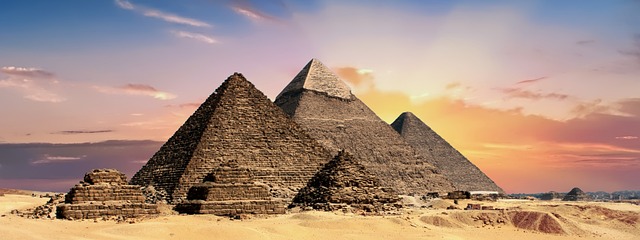Napoleon Buonaparte became a national hero in France by 1798 as a result of his conquest of Toulon and his successful campaign in Italy. Due to the probable political threat that his celebrity could pose to the in power Directory, he was delegated to a campaign abroad. The initial suggestion was to invade England, but France lacked the required naval strength to carry it out. As a result, the Directory agreed with Napoleon's plan to attack Egypt because it would require fewer ships and troops. Napoleon intended for this attack to establish a French colony in Egypt, which would pave the way for the French to return to India, where they had been expelled 30 years previously.
Napoleon thought everything was going according to plan until he saw Nelson had sunk the French fleet at Alexandria in Aboukir Bay. As a result, the British gained control of the shoreline and Napoleon's men had nowhere to go. He set up a government composed of local religious leaders and a few French officials without worrying. Napoleon portrayed his entry into Egypt as a deliverance from the Mamluks rather than an invasion because they opposed the political and theological demands of the Ottoman Empire, which the French supported.
The Mamluk General Ibrahim fled the fight near the pyramids, crossed into Syria, and started assembling a force to reconnoiter Egypt. In January 1799, Napoleon took the initiative and sent a force up the Nile to protect the southern flank as he marched toward Syria with 8,000 troops. His fast victories at El Arish and Jaffa gave him a false sense of security over the harbor city of Acre. He attacked without siege artillery and was repulsed, but in the middle of March he lay siege to the city. Napoleon was forced to abandon the siege and march away when plague hit the city, despite the fact that he had routed a Turkish force that had come to relieve Acre.
A Turkish invading force that arrived at Aboukir Bay with British assistance was ultimately routed by the French in late July. At that time, a British commander gave Napoleon newspapers that kept him informed of current developments in Europe, including the loss of Italy and a political upheaval in Paris. Napoleon's military might would be required on the Continent since a second alliance of countries, including Russia and the Ottoman Empire, was assembling to threaten France. Napoleon planned a covert escape and returned safely to France because he needed to protect his own career and gather reinforcements for the invasion in Egypt.
Napoleon traveled to Egypt with the goal of founding a colony and using it as a base of operations to battle the British in India. In this expedition, he also acted as Alexander the Great by bringing along a number of esteemed scholars and scientists to research Egyptian history and the feasibility of building a canal connecting the Mediterranean with the Red Sea. The first translation of hieroglyphics was made possible by the discovery of the Rosetta Stone during this expedition, which included a single message written in hieroglyphics, Greek, and Latin. This discovery also gave rise to the discipline of Egyptology.
Compared to the Knights of St. John, who had ruled the island for more than a century, Napoleon's administration on the island of Malta was far more effective. Both slavery and the nobility were abolished by him, and he also provided several local youngsters with the opportunity to study abroad in France. The invasion of Egypt was ultimately little more than a costly sideshow, but a French victory there might have altered the course of the Napoleonic era by requiring the British to reallocate their naval forces away from a blockade of Europe and forcing the European powers to pay more attention to the Ottoman Empire.

References:
Chandler, David, The Campaigns of
Napoleon (New York: Macmillan, 1966); Connelly,
Owen, Blundering to Glory (Wilmington, DE:
Scholarly Resources, 1987); Markham, Felix,
Napoleon (New York: New American Library,
1963).
Posted using Proof of Brain
